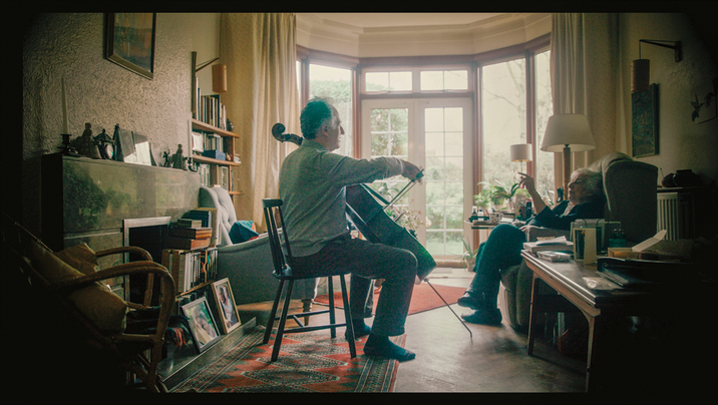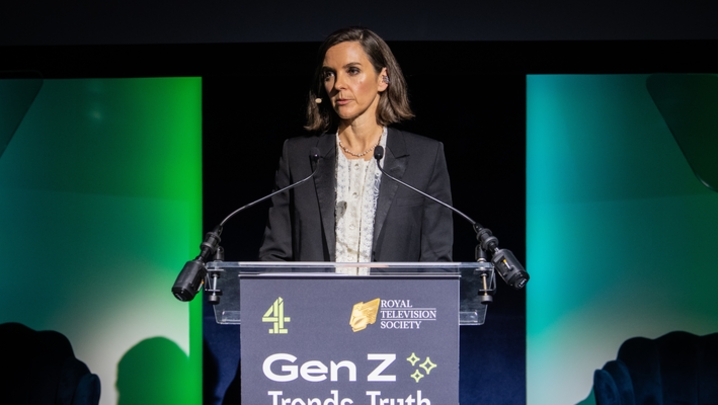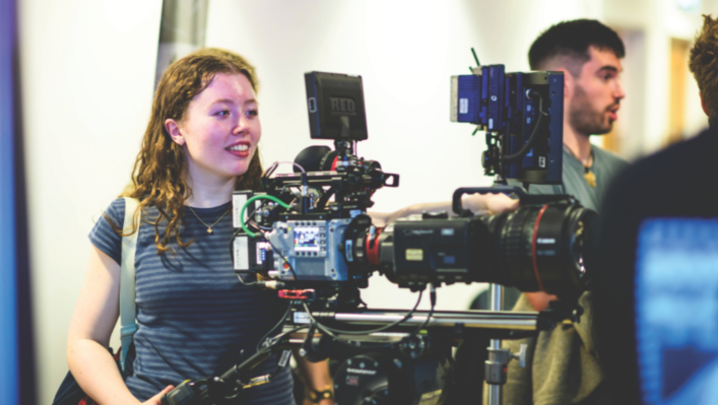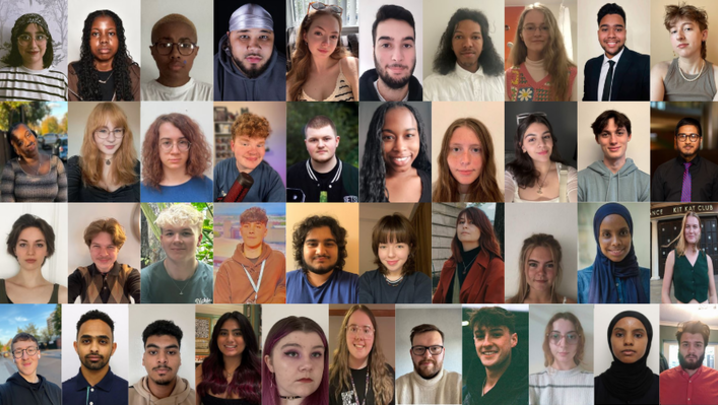From drama to factual TV, journalism and development, RTS Student Masterclasses offer invaluable advice on our industry
Never give up. Don’t be too precious. Build up your contacts. Educational qualifications are not the be-all-and-end-all. Be yourself. Be real. Those were just some of the words of wisdom from masterclasses focusing on these four areas of the industry…
Drama
Drama director Jordan Hogg had an epiphany. He was a young man coping with cerebral palsy and a difficult home life in Scarborough following his parents’ divorce. One Sunday afternoon, he was watching David Lean’s epic movie Lawrence of Arabia on Channel 4. The experience took him so far out of himself that, from that moment, he knew he wanted to become a film-maker.
“I completely forgot all the chaos around me. I got lost in the desert with Lawrence. This is proper magic.”
Hogg has always had an iron determination to overcome the obstacles life throws in his path. Despite leaving school with no qualifications, he now has more than 70 hours of broadcast TV to his credit. He trained through Channel 4’s 4Talent scheme after simultaneously working as a fitness instructor and studying film at university. “I graduated, and the next day I was working on Shameless as an apprentice director. I’d never even been on a professional set before,” he told the students.
Hogg added: “There’s no straight way into the industry. We’ve all come into it from different backgrounds and in different ways.”
Grabbing every opportunity that arose, Hogg always kept the contact details of everyone he met, and recommended that students use the same strategy. To succeed in the industry, it was important to be proactive and not sit around waiting to be offered employment, even when you’ve got an agent. “I’m an arsehole, that’s my biggest disability,” Hogg joked.
Shameless led to work on Hollyoaks via another contact and eventually to directing jobs on Doctors and Casualty, where he won a Bafta for an episode starring Hollywood actor Sharon Gless.
Another career highlight was directing the pioneering BBC One drama Ralph & Katie, British TV’s first mainstream drama to feature two learning-disabled lead actors. He said: “It was the most inclusive and happy environment I’ve ever worked in.”
Jordan Hogg was interviewed by Diederick Santer, content creator.
Factual TV
“My mother loves the title CEO but it means fuck all,” is how factual producer Camilla Lewis described her job in a compelling masterclass that had the audience eating out of her hands. Spontaneous applause broke out at several points, including when the joint CEO of Curve Media told students that she failed her maths O-level but was very good at business.
The fast-talking, supremely confident Lewis set up unscripted specialist Curve Media in 2014 after an impressive career at the BBC and Fremantle, working on some of British TV’s most enduring factual shows, such as Great British Railway Journeys, Escape to the Country and Grand Designs.
Lewis left school after failing her exams and attended Oxford Poly rather than Oxbridge; her father was a GP and her mother was a social worker. Her message to the students was clear: self-confidence, hard work, resilience (accepting lots of rejections went with the territory of being an independent producer), and the ability to think up and pitch ideas were all key to a successful TV career.
“I can recognise a good idea… but am very self-critical,” she said. Never short on ambition, Lewis revealed that she had wanted to be Britain’s first female Labour PM but had always loved TV. She once appeared as a contestant on ITV Saturday night dating show Blind Date.
Despite the slowdown in factual commissions, Curve remains busy. Among the seven returning series on its books are Channel 4’s fly-on-the-wall 999, On the Front Line, spotlighting medical emergencies, which has already run for 11 series.
“I’ve been making programmes like this for 25 years. I get access because institutions like the NHS know we can be trusted to make them ethically,” said Lewis.
A new BBC Two series, Chess Masters, was inspired by her teenage daughter suffering from mental health problems during the Covid epidemic. With the help of chess.com, she was able to turn her life round.
Camilla Lewis was interviewed by Tim Hincks, co-CEO at Expectation.
Journalism
Ria Chatterjee, a correspondent specialising in social affairs, described working for the “fearless” Channel 4 News as her “dream job”. Her upbringing in Porthcawl, Wales, where her family was one of just three South Asian households, informed her desire to become a journalist. “I was made to feel aware of my difference,” she recalled. At primary school, classmates ridiculed the Indian snacks she brought in – “there was no curiosity”.
On another occasion, her father took his employer to a tribunal. “I remember seeing him stand up in court to talk about his experiences of racism at work. I thought: ‘This is what we do as a family – we speak up, we fight injustice.’ I’ve always been interested in people’s lives that are different to mine and also in having an understanding of… marginalised communities. A lot of these people… are barely on the radar, and I wanted to have a go at bringing their voices into the news narrative.”
After studying at Cardiff University’s School of Journalism, Chatterjee worked for Sky News, BBC Regional News and ITV News London before joining Channel 4 in 2022. Students in the audience saw clips of Chatterjee reporting from a drug-ravaged estate in Marseilles and a heartbreaking encounter with the family of James Bascoe-Smith, a teenager left with life-altering injuries after a random knife attack.
Chatterjee said that reporting harrowing stories has had an impact on her mental health. While at ITV London, she visited the scenes of many stabbings and met grieving families. She praised the counselling provided by ITN, but revealed: “I had to learn quite quickly to switch off.”
Asked to identify the key attributes of a news correspondent, Chatterjee highlighted “empathy and humanity, and being able to connect with people”. She added: “Be yourself and be real – that is a huge deal to a person who is taking a risk in sharing their story with you.”
Ria Chatterjee was interviewed by Ben de Pear, founder, Basement Films.
Development
Quiz and factual entertainment specialist Dorsa Nam from MultiStory Media, one of two development executives giving the masterclass, told students: “I come up with things all the time in my head – whether they’re any good is another question!”
She was joined by Dan Omnes from Blast Films, who developed Netflix series The Man with 1000 Kids and BBC One film Big Gay Wedding with Tom Allen. The key skills, he said, were a facility for writing, brainstorming and pitching – “it’s like a real-life The Apprentice”.
Nam developed BBC daytime quiz Bridge of Lies and Dave’s Big Zuu’s Big Eats, in which the grime artist cooks for celebrities and stand-up comics. The idea for the latter came from Nam’s love of grime, and from a researcher in her team who had seen Big Zuu cooking on YouTube. She made a sizzle reel “to sell Big Zuu’s talent… and took it to UKTV”. The show was snapped up.
The job, explained Nam, is “half creativity, half salesman – you have to convince people”. Those “people” include potential talent for the show, the production company you work for or the channel commissioner, all of whom must see your idea as a winner.
Rejection may come but is part of the job, said Nam: “You get ‘No’ more than ‘Yes’. You need self-esteem and resilience. You can’t let it affect you for too long – you have to keep going.”
Compromise, especially at a time when factual TV commissions can be scarce, is often needed to get a show over the line. “You can’t be too precious,” said Omnes. Television, added session Chair Emma Read, “is a huge collaborative process… anyone’s idea matters if it makes sense and [leads to] a better end product”.
Dorsa Nam and Dan Omnes were interviewed by Emma Read, MD of Emporium Productions.
All RTS Masterclasses were produced by Diana Muir and Helen Scott and held at Kings Place, London, on 7 November. Reports by Steve Clarke and Matthew Bell.







